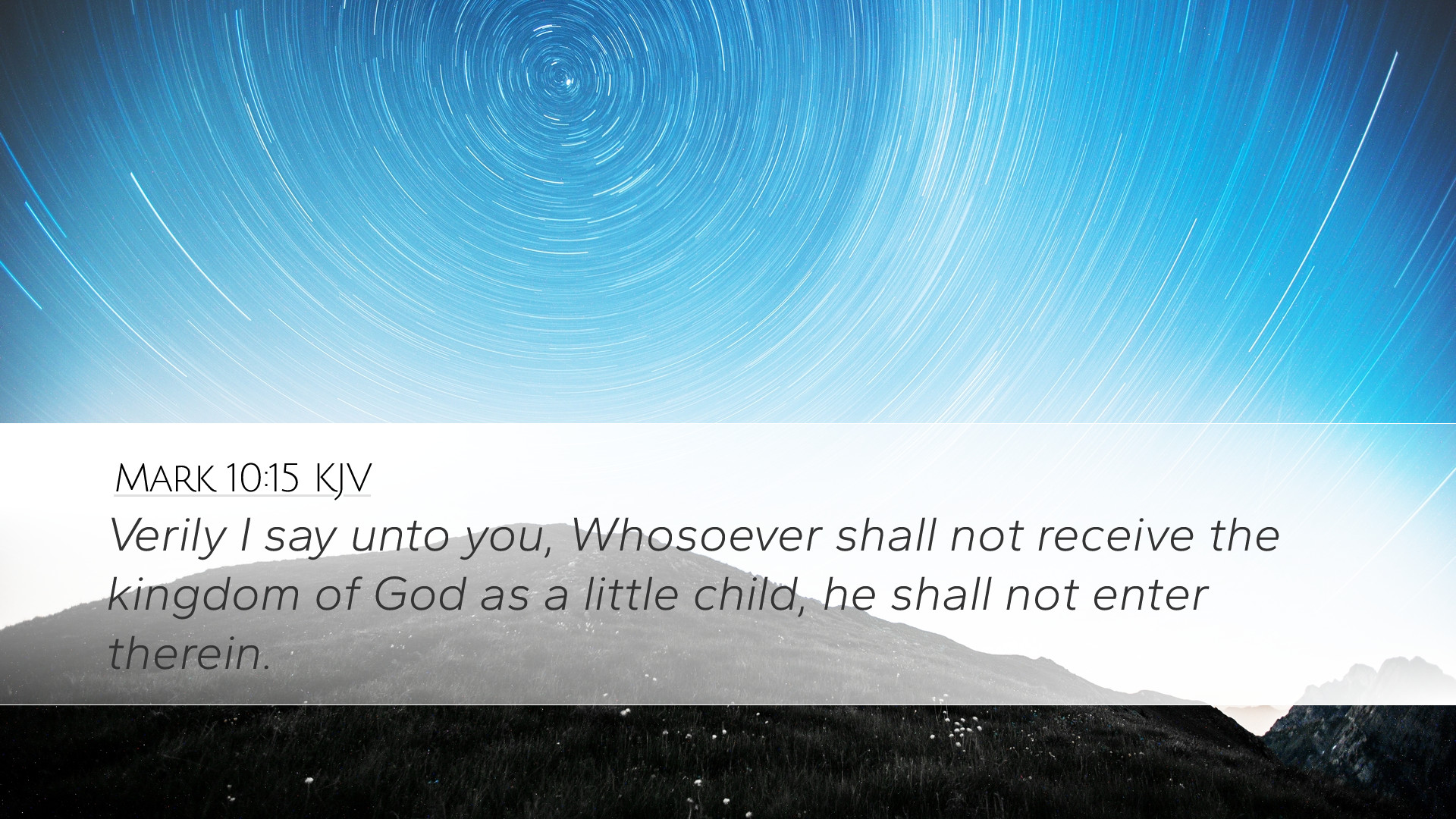Bible Commentary on Mark 10:15
Text of Mark 10:15 (KJV): "Verily I say unto you, Whosoever shall not receive the kingdom of God as a little child, he shall not enter therein."
Introduction
This verse is critical in understanding the nature of the Kingdom of God and the attitude that is required to enter it. It emphasizes humility, trust, and the innocence of children as essential qualities for believers.
Exegesis of Mark 10:15
In this passage, Jesus teaches His disciples about the necessity of approaching God with the childlike faith that is essential for salvation. He emphasizes the seriousness of His statement by using the word "Verily" which denotes that what He is about to say is both true and important.
Insights from Matthew Henry
Matthew Henry remarks on the nature of children and their dependence on adults, indicating that this dependence mirrors the dependence that believers must have on God. Henry states:
"Those who would enter into the kingdom of heaven must be humble and simple, like children."
According to Henry, this humility allows adults to discard their pride and self-importance, allowing for a pure approach to faith. He emphasizes that it is not merely about being like a child in innocence but also in the way they trust completely in those who care for them.
Insights from Albert Barnes
Albert Barnes offers a systematic approach to interpreting this verse. He explains that the simplicity and trustfulness of a child is an example of the attitude believers should have towards God. Barnes notes:
"Children are free from the malice, strife, and pride which characterize adults, and they approach their parents with a full trust in their goodness."
Barnes highlights that this trust in God should not be naïve but rather a reflective trust that acknowledges our own weaknesses and God's infinite wisdom. He underscores the importance of humility and suggests that without adopting this childlike spirit, one risks rejecting the grace offered through Jesus Christ.
Insights from Adam Clarke
Adam Clarke's commentary expands on the concept of receiving the Kingdom of God. He explains that receiving the Kingdom "as a little child" suggests an acceptance of the gospel with simplicity and sincerity. Clarke explains:
"To receive the kingdom of God means to accept its principles and live by them, not with an intellectual basis alone, but from the heart."
This indicates that the approach to faith must be genuine and not merely academic. Clarke implies that the complex theological doctrines can often confuse believers, but a child’s uncomplicated faith is the key to understanding God's Kingdom. He asserts the notion that those who come to Christ with preconceived notions and conditions limit their ability to enter the Kingdom.
Theological Implications
Throughout the commentaries of these scholars, a consistent theme arises regarding the conditions of entering the Kingdom of God. The qualities of humility, simplicity, and trust are not merely commendable traits but are essential to one's approach to God. Higher education and doctrinal knowledge, while valuable, must not overshadow the fundamental call to be in relationship with God using childlike faith.
Humility
True humility is recognizing our need for God’s grace and mercy. In drawing parallels with children, believers are reminded of their inability to save themselves and their absolute reliance on God’s redemptive plan through Jesus Christ.
Faith and Innocence
Children embody an innocence that is often lost as one grows older. This childlike faith embraces the mystery of God and the elements of faith that may seem paradoxical to human reasoning. The ability to believe without needing to see or fully understand is a theme echoed in many theological discourses.
The Call to Discipleship
Mark 10:15 invites believers to reconsider what it means to be a disciple of Christ. It suggests that the journey of faith is not about accumulating knowledge or proving one’s worth but rather about a sincere and genuine relationship with God, approached with love and trust akin to that of a child.
Conclusion
Mark 10:15 serves as a foundational verse that calls everyone—pastors, students, theologians, and scholars—to re-evaluate their approach to the Kingdom of God. Emulating the qualities of a child can transform one’s spiritual journey, leading to deeper faith, a more profound understanding of grace, and a more authentic relationship with Christ. As believers strive to embody these traits, they participate fully in the Kingdom that God has prepared for those who are humble, trusting, and willing to receive His love.


